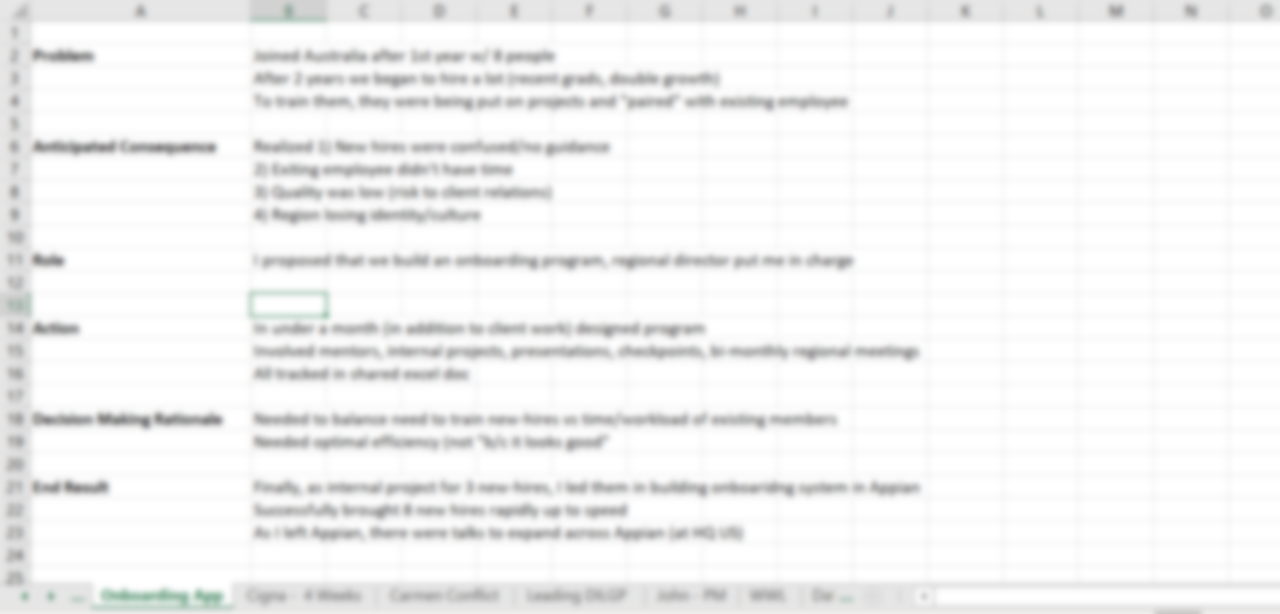How long should I spend in answering a behavioral question?
Get Active in Our Amazing Community of Over 451,000 Peers!
How long should I spend in answering a behavioral question?
Overview of answers
Hi Anonymous,
The main principle is structuring your answer top-down.
In this case the actual length of your answer becomes even mostly irrelevant, since you can always easily react to your interviewers' implicit signals and stop anytime or go into more details level by level.
With that top-down approach he still always gets the full picture (as opposed if you would build your answer bottom-up) and can prompt for more details whenever required.
Hope that helps - if so, please be so kind to give it a thumbs-up with the green upvote button below!
Robert
Present a summary in ~90seconds with situation, complication, resolution. Then give them time to ask questions and dig into the details.
Hi there,
Interviewers at McKinsey will generally lead you through the process and timing. In general:
- Start giving 1-2 minutes overview of the situation and the big steps you took to solve it
- From there you can ask your interviewer if he/she wants more context of would like to focus on a specific part
Best,
Alberto
Hi there,
It depends on a number of factors. Mainly:
- How fast you speak
- The question asked
- Presence of followup questions
A good benchmark is 1-2 minutes for non PEI/stories and 3-4 minutes for PEI/stories for your part. At least for the PEI questions, the interviewer will interrupt you and with his/her questions and your replies overall it will last 10-15 min.
Best,
Francesco
Around 1-3 minutes per question, if you are not in a McKinsey interview.
In terms of preparing these stories....
Resume walkthrough
- Needs to be chronological
- Only keep important details that make you look good (i.e. I worked across 7 industries and rose up the ranks twice in the course of that role)
- Keep a theme of "why consulting"
- I.e. at each step you need to show that you both got exposure to aspects of consulting AND thrived + enjoyed them
- Finish with: And that's why I'm here today looking for consulting with your company

Why Consulting
- You need to summarize what you did before along the theme of consulting aspects you liked and consulting aspects that were missing
- You then combine those two - i.e. I know I like + am good at x, y, and z which is required for consulting, and I really am excited to get a, b, and c
- You finish with a "mini" why x company

Why x company
- Start with a "mini" why consulting
- Then have 2-3 reasons why x company is your target
- Every "reason" needs to incorporate 1) That you know they value x 2) That you not only value x but have exhibited it and done it in the past
- Be very very mindful of what they want you to want

Personal Stories
Step 1 - Categorize the main stories
There are 5-10 "themes" you need to prepare for. i.e. Leadership, teamwork, challenge, etc. Figure out this list and make sure your stories cover this range (PM me and I can provide you with a template for this list)
Step 2 - Create FLEXIBLE stories that cover a range of categories
You need to create 4-6 stories that each cover a range of topics. They need to be powerful stories that can be adjusted and adapted based on the question asked.
One of my "core" or "killer" stories was usable for Initiative, Achievement, Leadership, Challenge, Change of direction, AND Persuasion.
Write down these stories along STAR or similar format...use bullet points

Step 3 - Organize these stories so you know which ones can be used for what and PRACTICE
Make sure you cover the whole gambit. Then, practice getting asked a question and thinking of which stories apply. I can assure you, no-one is coming up with full stories in a few seconds. Rather, they have practiced how to adapt an existing story to the question asked.

How much time exactly is not just depended on you, but it also depends on the interviewer. Because a lot of interviewers like to ask follow-up questions on your stories, and sometimes for the single stories the interviewer can spend the entire FIT part (it's around 20 minutes).
However, what I can surely tell you that, when you are answering, every answer you should try to restrict within the 3 minutes. Because psychologically, more the 3 minutes of a monologue is not good communication, because the opposite person loses his concentration.
So, how does that pen out?
For example, if the interviewer asks, "Can you tell me a story where you demonstrated entrepreneurship spirit?", so make your answer usingSTAR model. That answer shouldn't be longer than 3 minutes. It should be exhaustive to cover the story, but it shouldn't be too long. However, be prepared to answer the follow-up question, if an interviewer specifically says: "Ok, so why don't you tell me, what exactly you did in this particular part of the story?".
Again, your time will start, and make sure that this answer is in line with the structure and don't talk longer than 2-3 minutes.
This series of conversations sometimes gets to the entire FIT part, or sometimes interviewers ask different questions.
I hope this answers your question.
GB
The interviewer will look less on how long exactly it took you to answer the question and more on how effective communicator you are.
First, try not to give too much unrelevant context. Often candidates tend to go very long on the context which the itnerviewer don't care much about beyond getting the overall picture. Usually 1-3 sentecnces for the context are enough and then get ot the essence of the answer.
Second, make sure you are structured! It can be "Situation->Comlication->Resolution" and it can be just "3 factors" or "3 reasons". When you go through the structure it is always great to go top down - start with high level description of each part and then get to the details.


